Bibliografische Information der Deutschen Bibliothek
Die Deutsche Bibliothek verzeichnet diese Publikation in der Deutschen Nationalbibliografie; detaillierte bibliografische Daten sind im Internet ber http://dnb.ddb.de abrufbar
Rangendingen, May 2013
by LIBERTAS - Europisches Institut GmbH
LIBERTAS Europisches Institut GmbH,
Lindenweg 37, 72414 Rangendingen, Germany
Tel. +49 7471 984996-0
Fax +49 7471 984996-19
eMail: verlag@libertas-institut.com
Internet: www.libertas-institut.com
ISBN 978-3-937642-40-6 (print)
ISBN 978-3-946119-09-8 (epub)
ISBN 978-3-937642-41-3 (mobipocket)
Dedicated to my late grandparents
The Aut h or
 Didem Ekinci, Ph.D. was born in Ankara/Turkeyin 1976, obtained a B.A. at Hacettepe University (Ankara) in 1999 and received her M.A. and Ph.D. in International Relations at Bilkent University (Ankara), in 2002 and 2009. She taught courses as teaching assistant and as instructor at Bilkent University during her Ph.D. candidacy. In September 2009, she joined the Political Science and International Relations Department of ankaya University (Ankara) working as assistant professor. The undergraduate courses she teaches include Balkan Politics, Foreign Policy Analysis, Eurasian Politics, Turkey-EU Relations, Environmental Politics, Russian Politics and Foreign Policy. At the graduate level, she teaches Politics in the Balkans and the Caucasus, and Greek Politics and Foreign Policy.
Didem Ekinci, Ph.D. was born in Ankara/Turkeyin 1976, obtained a B.A. at Hacettepe University (Ankara) in 1999 and received her M.A. and Ph.D. in International Relations at Bilkent University (Ankara), in 2002 and 2009. She taught courses as teaching assistant and as instructor at Bilkent University during her Ph.D. candidacy. In September 2009, she joined the Political Science and International Relations Department of ankaya University (Ankara) working as assistant professor. The undergraduate courses she teaches include Balkan Politics, Foreign Policy Analysis, Eurasian Politics, Turkey-EU Relations, Environmental Politics, Russian Politics and Foreign Policy. At the graduate level, she teaches Politics in the Balkans and the Caucasus, and Greek Politics and Foreign Policy.Didem Ekinci has published both in scientifically indexed (SSCI and AHCI) and other indexed (EBSCO, etc) journals, mostly in English. The publications are primarily on the Balkans and TurkishBalkan relations, and at the second level on the Caucasus.
Her research interests are, among others,Balkan politics, TurkishBalkan relations, European Union, Russian politics and foreign policy, Caucasus, energy politics in the Balkans and theCaucasus. She took part in many international conferences, above all in Turkey, Georgia, Macedonia, Bosnia-Herzegovina and Albania, and contributed to or wrote publications in Turkey, Albania, Romania, Bulgaria, Azerbaijan and Germany.Didem Ekincispeaks English, French, German and Russian.
Table of Contents
ACKNOWLEDGMENTS
This book has been made possible with the strong moral support of my parents, my former dissertation supervisor Prof. Nur Bilge Criss, my students both at the undergraduate and graduate level who contributed with thought-provoking statements on different aspects of the subject matter in class, and my Russian language teachers who always encouraged me for further research and writing on Russia .
Special thanks go to Marija Risteska for her recommendations on publication options.
LIST OF ABBREVIATIONS
ABM Treaty Anti-Ballistic Missile Treaty
AFSOUTH Allied Forces Command South
APEC Asia-Pacific Economic Cooperation
ASEAN Association of Southeast Asian Nations
BSEC Organization of the Black Sea Economic Cooperation
BSP Bulgarian Socialist Party
BTC Baku-Tbilisi-Ceyhan Oil Pipeline
CIS Commonwealth of Independent States
COMINTERN Communist International
COMKFOR Commander, Kosovo Force
CSCE Conference on Security and Cooperation in Europe
CSTO Collective Security Treaty Organization
DPA Dayton Peace Accord
EC European Community
ECT Energy Community Treaty (2005)
ENI Ente Nazionale Idrocarburi (Italian multinational oil and gas company)
EU European Union
FRY Federal Republic of Yugoslavia
GDP Gross Domestic Product
IFOR Implementation Force
IMF International Monetary Fund
ICTY The International Criminal Tribunal for Former Yugoslavia
JNA Yugoslav Peoples Army
KFOR Kosovo Force
KLA Kosovo Liberation Army
NAC The North Atlantic Council
NATO North Atlantic Treaty Organization
NIS Naftna Industrija Srbije (energy company in Serbia )
OAF Operation Allied Force
OHR Office of the High Representative
OIC Organization of the Islamic Conference
ORT Ob shchestvennoe Rossiiskoe Televidenie ( Russian Public Television )
OSCE Organization for Security and Cooperation in Europe
PfP Partnership for Peace Program
PIC Peace Implementation Council
PJC NATO-Russia Permanent Joint Council
RTR Russian Television and Radio
SAA Stabilization and Association Agreement
SACEUR Supreme Allied Commander Europe
SCO Shanghai Cooperation Organization
SFOR Stabilization Force
SFRY Socialist Federal Republic of Yugoslavia
SHAPE Supreme Headquarters Allied Powers Europe
UN United Nations
UNSC United Nations Security Council
UNPROFOR United Nations Protection Force
VOPP Vance-Owen Peace Plan
WTO World Trade Organization
INTRODUCTION
The end of the 1980s demonstrated that a once-and-for-all change was due in not only the history of the Soviet Union , but also the world. Despite changes in its issue content, Russian foreign policy after 1990 retained its importance with regard to local, regional and global developments. As Russian decision-makers tried to righteously position Russia in the global political and economic system as they thought Russia deserved, Russia faced multiple foreign policy challenges, ranging from local to global. One such challenge surfaced in the Balkans as the disintegration of the Yugoslav state led to the bloody and violent replacement of the old order. Formerly in the Soviet influence zone, the Balkans now presented a major challenge for the new Russian state in terms of being the first test case for Russian foreign policy-making. The fact that the disintegration of Yugoslavia came about with violence put Russian decision-making capacity and limits into an even more precarious condition. Had the Yugoslav disintegration taken place non-violently - as in the case of the Soviet Union - Russian foreign policy would still steer in the course it had taken, yet the level of animosity vis--vis the West over the Balkans would not be as high.
It goes without saying that Russia s relations with the Balkans were not crea ted anew by early 1990s and had been an integral part of its foreign policy agenda since the Tsarist times. To what extent Russia s Balkan relations and policies were sustainable were put into test at least twice after 1990, during the wars in Bosnia -Herzegovina and Kosovo . As this book shall maintain, Russia s Balkan policy lines mostly displayed aspects of continuity after the Cold War, although moments of deviation were also allowed.
In such a context, part II provides an overview of Russian foreign policy-making after 1990s by outlining the political currents that left their imprint in Russian domestic and foreign policy understanding in the past two decades. The political currents inevitably imply a number of policy tenets most articulated by Russia in the concerned period, which are considered to apply to Russian foreign policy rhetoric as regards the post-Cold War Balkans, in both peaceful and conflict times. The trajectory of the developments in the Balkans, particularly during the twin crises of 1992-1995 and 1999, revealed at least four policy pillars which prioritized Russias role as a great power, emphasized the centrality of the UN in international relations, opposed NATO expansion and stressed the significance of multipolarity in international relations.

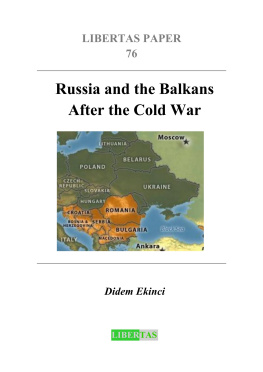

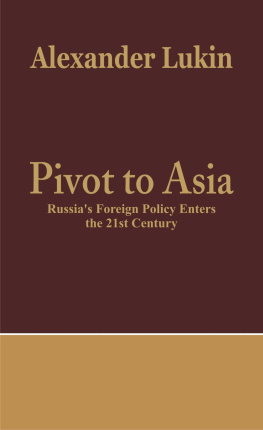
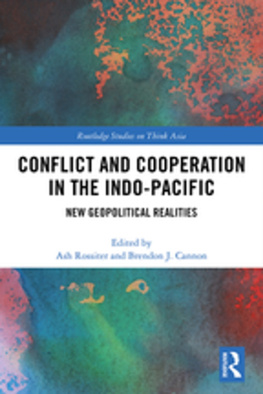
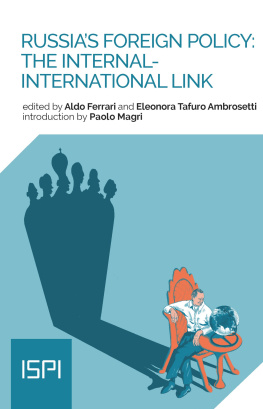
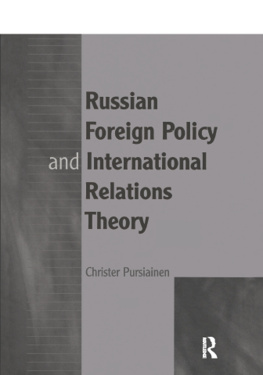
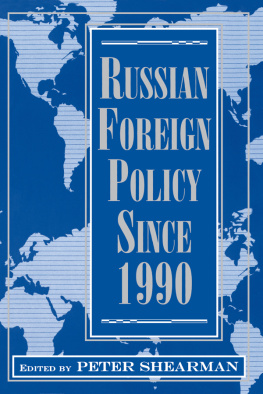
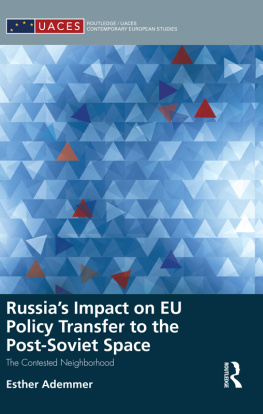
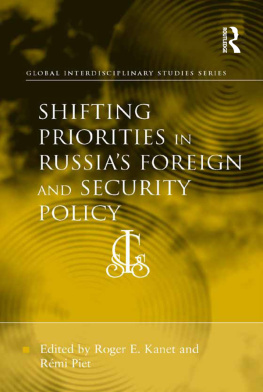

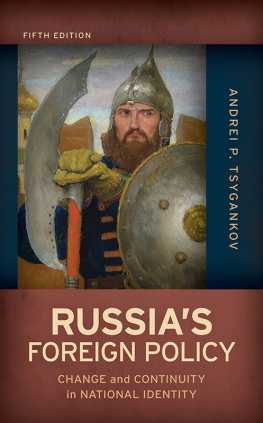

 Didem Ekinci, Ph.D. was born in Ankara/Turkeyin 1976, obtained a B.A. at Hacettepe University (Ankara) in 1999 and received her M.A. and Ph.D. in International Relations at Bilkent University (Ankara), in 2002 and 2009. She taught courses as teaching assistant and as instructor at Bilkent University during her Ph.D. candidacy. In September 2009, she joined the Political Science and International Relations Department of ankaya University (Ankara) working as assistant professor. The undergraduate courses she teaches include Balkan Politics, Foreign Policy Analysis, Eurasian Politics, Turkey-EU Relations, Environmental Politics, Russian Politics and Foreign Policy. At the graduate level, she teaches Politics in the Balkans and the Caucasus, and Greek Politics and Foreign Policy.
Didem Ekinci, Ph.D. was born in Ankara/Turkeyin 1976, obtained a B.A. at Hacettepe University (Ankara) in 1999 and received her M.A. and Ph.D. in International Relations at Bilkent University (Ankara), in 2002 and 2009. She taught courses as teaching assistant and as instructor at Bilkent University during her Ph.D. candidacy. In September 2009, she joined the Political Science and International Relations Department of ankaya University (Ankara) working as assistant professor. The undergraduate courses she teaches include Balkan Politics, Foreign Policy Analysis, Eurasian Politics, Turkey-EU Relations, Environmental Politics, Russian Politics and Foreign Policy. At the graduate level, she teaches Politics in the Balkans and the Caucasus, and Greek Politics and Foreign Policy.